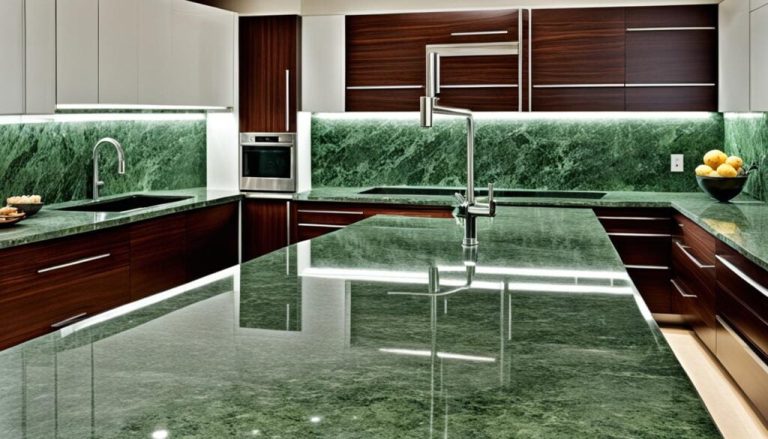Introduction
With the increase in consciousness of the global citizens concerning environment, people have started implementing many standards of sustainability especially while constructing / selecting homes. There are numerous materials which can be used but one of the most popular natural stone that is used is the granite. This guide will look at the sustainability features of this worktop option and why granite is still a great choice for the environmentally friendly homeowner.
Granite: A Renewable Material
It should be noted that granite is one of the few materials that does not require a great amount of energy to be used in the manufacturing of various products, as it is actually a natural material, and is in fact very environmentally friendly in many aspects. Granite is a naturally formed rock created through geological solutions thus the quarried product does not come with the same high percentage of carbon footprint as manufactured products. Comparing this with other materials, it can be noted that granite extraction causes less damages to the environment than the extraction of many other types of materials.
Durability and Longevity
Granite worktops are usually very strong and long-lasting this means that they are good for the environment. the fact is that granite if cared properly can serve individuals for decades, and hence rarely resulting in replacement, so the demand for fresh resources is dampened. Housing, fire, stain, and scratch resistant are qualities that make these surfaces not only beautiful but are lengthy, and thus, decrease the use of resources.
Granite production process also includes that it does not consume a lot of energy like most of other stone materials are used. The use of water recycling in the production processes is common in most of the granite quarries and most of them practice proper management of wastes. Moreover, its production from locally available granite can greatly reduce the percentage of the total carbon footprint arising from transport, making it even environmentally friendlier. Granite worktops are also recyclable and may be recycled at the end of their useful life so that there will be a minimal wastage on the environment.
Aesthetic and Economic Value of Granite
Beyond sustainability, granite offers significant aesthetic and economic benefits that contribute to its long-lasting appeal. The natural variations in color and pattern ensure that granite worktops remain timeless and stylish, reducing the likelihood of homeowners replacing them for cosmetic reasons. This longevity not only extends the material’s lifespan but also minimizes waste.
Moreover, the economic advantages of granite worktops make them a wise investment. While granite may have a higher upfront cost compared to other materials, its durability and low maintenance requirements lead to lower long-term costs. Additionally, granite worktops can enhance the overall value of a property, making them a worthwhile investment for homeowners.
Making the Best Sustainable Choice with Granite Worktops
When selecting granite as an environmentally friendly option for your space, there are several ways to further minimize its environmental impact. Opting for domestically sourced granite reduces transportation energy costs. Additionally, choosing lighter-colored granite can reflect natural light, thereby decreasing the need for artificial lighting and further conserving energy.
It is also important to ensure that the granite you choose comes from environmentally responsible quarries. Many suppliers have sought certification to demonstrate compliance with sustainable extraction practices, making it easier for consumers to make ethical choices
Health and Safety Considerations
In addition to its aesthetic and environmental advantages, granite worktops offer important health and safety benefits. Being naturally non-porous, granite surfaces are resistant to bacteria and mold, making them a hygienic choice for food preparation areas. This property ensures that harmful pathogens have a harder time adhering to the surface, contributing to a safer environment for families. Moreover, granite is a naturally occurring material that does not emit volatile organic compounds (VOCs), which can be harmful to indoor air quality. By choosing granite worktops, homeowners not only enhance the beauty of their spaces but also prioritize the health and well-being of their families.
A Commitment to Sustainable Practices
Choosing granite worktops is not just about aesthetics or functionality; it reflects a commitment to sustainable living. Homeowners can further their eco-conscious efforts by seeking out suppliers who engage in responsible quarrying practices and offer transparency about their sourcing methods. Additionally, many granite fabricators are now adopting eco-friendly techniques in the cutting and finishing processes, reducing waste and minimizing water usage. By supporting businesses that prioritize sustainability, consumers can contribute to a broader movement toward environmentally responsible building practices. Ultimately, selecting granite worktops allows homeowners to enjoy a beautiful and functional space while making choices that benefit the planet for generations to come.
Investment in Timeless Design
Investing in granite worktops is not only a decision for today but also a commitment to timeless design. The unique characteristics of granite, including its natural patterns and colors, ensure that each piece is a one-of-a-kind work of art, elevating the overall aesthetic of any space. Unlike trends that may fade, granite’s classic elegance resonates across various design styles, from rustic to contemporary. This enduring appeal means that homeowners are less likely to feel the need to replace their countertops for stylistic reasons, resulting in less waste over time. By choosing granite, you are not only enhancing the beauty of your home but also making a sustainable choice that aligns with a philosophy of lasting quality and enduring style.
Conclusion:
All in all, Granite worktops is a hard surface with low emission rates and known to be recyclable thus providing some environmental advantages. It is an environmental friendly product since it is naturally derived from marble and is long lasting for the homeowners to use in their worktops. Thus, where obtained appropriately, granite is one of the sustainable and eco-friendly materials to be used in homes. This paper uncovers how through the process of kitchen remodeling or constructing new homes aged granite remains a fashionable and environmental option for today’s society.

